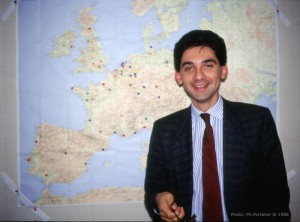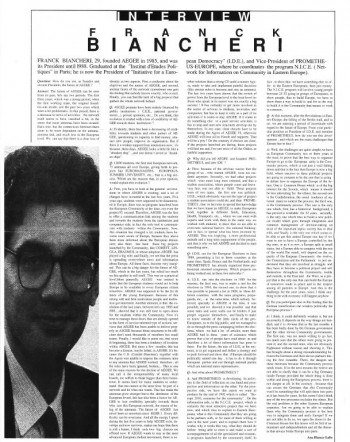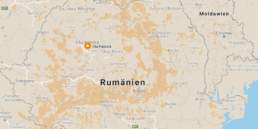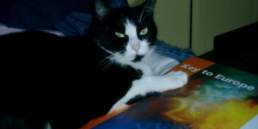AEGEE founder Franck Biancheri, who passed away on 30th of October 2012 with only 51 years, gave a lot of interviews for AEGEE publication. The Golden Times is presenting you the ones that still can be found. The text below was published in May 1990. These were turbulent times, which is strongly reflected by the concerns of Franck Biancheri for the future of AEGEE. A few months after the Berlin Wall fell, AEGEE was spreading fast to Central and Eastern Europe – so fast that it was hard to keep track. The opening to the East caused many discussions in AEGEE about the future and priorities of the association. The interview by Ana Blanca Gallo reflects the atmosphere of change in the association – many of the mentioned problems have been overcome, others still persist. The text was only slightly edited: some grammar and spelling mistakes were corrected and one answer, which was 725 words long, was put into four pieces, but not shortened.
FRANCK BIANCHERI, 29, founded AEGEE in 1985, and was its President until 1988. Graduated at the “Institut dEtudes Politiques” in Paris; he is now the President of “Initiative for a European Democracy” (IDE), and Vice-President of Prometheus-Europe, where he coordinates the program NICE (Network for Information on Community in Eastern Europe).
 Question: How do you see, as founder and ancient President, the future of AEGEE?
Question: How do you see, as founder and ancient President, the future of AEGEE?
Answer: The future of AEGEE can be seen from its past, let’s say two periods. The first three years, which was a strong period, when the first working team, the original founders, was inside; and the past two years which were a bit problematic. In this period, there is a decrease in terms of activities; the network itself seems to have vanished a bit, in the sense that more antennas have been created, that’s true, but the connections between them seem to be more dependent on the antenna-antenna link, and much less in the European level. We can say that there is a clear loss of identity in two aspects. First a confusion about the objectives and the nature of AEGEE, and second, unclear limits of the network (sometimes one gets the feeling that nobody knows exactly, who is not). Finally, you can feel the lack of a big project that gathers the whole network behind.
Q: AEGEE projects have been mainly financed by public institutions (C.E.E., national governments…), private sponsors, etc… Do you think, this evolution is related with a loss of credibility of AEGEE towards these institutions ?
A: Evidently, there has been a decreasing of credibility towards students and other partners of AEGEE, questioning its capacity to find money, attract new people, improve its organisation. But if there is a weaker support from institutions now, it’s because, these days, AEGEE looks a little bit like a “drunken ship” …and one doesn’t invest in “drunken ships”.
Q: 12000 students, the first real European network, 75 antennas all over Europe, giving birth to projects like Euromanagers, Europolis, Summer University, etc., that is a big success. Which are the reasons that, in your opinion, would explain this evolution ?
A: First, you have to look at the general environment in where AEGEE is existing, and a lot of changes have occurred in the last five years. Five years ago, students were supposed to be disinterested in Europe, there was no program launched from the European Community at the time, not even the project 92 existed. Therefore, AEGEE was the first to offer a communication link among the students and towards the students from the institutions and companies side; in fact the only tool to communicate with students within the Community. Now, this situation has changed a lot, students have become more aware of Europe, because they have been more informed about the European dimension; also there has been these big projects launched by the Community, like Comett, Lingua, Erasmus, in whose adoption AEGEE has played a big role; and finally, we see that the press is spreading everywhere news and information about Europe. All these facts become very marginal. This can be a big danger for the future of AEGEE, which in the last years, has relied too much on this quality to sell itself. This was on a practical level.
Q: And on a general level?
A: More generally, AEGEE was created to make that the European students would act to help Europe to be available to every European citizen tomorrow. AEGEE was supposed to be the “fer de lance” of the young Europeans. Because of this strong will and firm motivation people and institutions got interested. Another element, is that the evolution of the last years, between let’s say 1985 and 1988, showed that it was still time to open doors for the students within the Community. Now it’s time to manage these doors that are already opened in the form of service-oriented type of actions; services that AEGEE has been unable to deliver properly as AEGEE because these structures to be efficient don’t need thousands of members but small teams. Finally, I would like to point out, that since the beginning, there has been a tendency of localism within AEGEE. But since a few months, this has become a disease, maybe lethal, in AEGEE.
Q: Why?
A: It’s because the CD (Comité Directeur), together with the Agora, was unable to impose the common rules to any antenna how AEGEE worked; therefore, all the rules have been ignored, broken… This is one of the main reasons for the decline of AEGEE. We can call it the irresponsibility of many local boards, too selfish to think bigger than their hometown. It seems hard for many students to understand that one cannot at the same time be part of a network and do what one wants. This has made the antennae grow stronger, but to the detriment of the European level, this has also been a factor for AEGEE to lose credibility specially towards those who saw this European network, the reason of being of the antennae.
Q: So what do you expect for the future of AEGEE?
A: The future of AEGEE has never been so uncertain since EGEE I. Every difficulty can be overcome. And all the energy I spent during the last five years to help AEGEE exist, develop and now survive, makes me hope that there is still a future. I think only two big choices are offered now: If AEGEE wants to stay as the most advanced European student movement, there is no other solution than a strong CD and a mature Agora, ready to take and implement painful decisions (like stricter rules to become and stay an antenna). The last two years have shown that the switch of power from the European level to the local level (or those who speak in its name) was not exactly a big success! It has certainly to get more involved in the sector of services to students, universities and companies; but it has to keep it only as a part of its activities if it wants to stay AEGEE. If it wants to do something else or pure service activities, it has to stop and start develop new structures out by themselves. In any case, clear choices have to be made during the Agora of AEGEE VI, otherwise AEGEE will lose all its friends and supports. That will be a pity! On the contrary if choices are clear, if the projects launched are daring, these projects will find me and, I’m sure most of all the oldies, as faithful supporters.
Q: Why did you leave AEGEE and founded Prometheus, and later IDE ?
A: First, because of the obvious reason that the group of us, who started AEGEE, were not students anymore. Secondly, we had other projects which were more long-term oriented, and that a student association, where people come and leave very fast, was not able to fulfill. These projects were of two types, the first one was political, IDE, which obviously was not the type of project a student association could do; and then Prometheus, that in fact tries to spread this knowledge that we have gathered in AEGEE; to make Europeans work together in different fields, Education, Health, Transports, etc., where we can meet with experts and work with them in the same way we worked with students; to show that we are able to overcome national barriers, the national thinking; and in fact, to spread what has been invented by AEGEE. That was implying a more professional attitude and a long term engagement of the people, and that is why we left AEGEE and decided to start something new.
Q: IDE ran for the European Elections in June 1989, presenting a list in three countries at the same time, Spain, France and the Netherlands; and Prometheus has already organized three professional oriented congresses. Which projects are being worked out, in these two networks?
A: lDE ran into the elections in 1989 for the reasons; the first one, was to make a test for the elections in 1994; the second one, to show that it was possible to present a list in 1989, in three different countries with the same programs, propaganda, etc. – at the same time, which nobody believed, especially in AEGEE all the time, it was possible, and we showed it was possible and that some rules and some walls can be broken if just people organise themselves; and finally to make us know outside of the little circle of the pro-Europeans, so to the big public, and we managed to do so through the press campaigning before the elections, where we had a lot of articles, more than AEGEE had in three years of existence which proves that a lot of people have read about us and therefore a lot of direct information has gone to them. For the future, the aim of lDE at the moment, is to get organised and define a strategy and to push forward and show that if Europe should be politically united one day, it has to do it through European parties and not through national parties which are national states représentants.
 Q: And what about Prometheus?
Q: And what about Prometheus?
A: And Prometheus is developing its activities in the field of reflection on one hand and prospective and information on the other. For the prospective side, we have this report we want to produce by the end of 1992 which is called “Europe 2010, scenarios for the community”. On the information side, is the NICE project, which is certainly the most attractive project that we have now, and which tries to explain to Eastern Europeans, what is this Community that they are going to be partners with, or for most of them willing to join in the next years; and to explain them how it works; why it works this way, what they should do before being able to enter it and make a sort of accompaniment of all the specialized and economic programs launched by the community itself. In fact, to show that we have something else to offer to the Eastern Europeans, than just money. The NICE program will involve young people between 25 and 35, going in groups of Europeans, to show people, that to build Europe, we have to show them a way to build it; and for as the way to build it is the Community that means to work in common.
Q: At this moment, after the Revolutions in Eastern Europe, the falling of the Berlin wall, and so on, we are entering a period of incertitude with regard to the future of Europe. From your particular position as President of IDE and member of Prometheus, how do you see this development , and which are the main challenges that Europe has to face ?
A: Well, the challenges are quite simple. We have as European Community two or three years at the most, to prove that the best way to organize Europe to go to the European unity is the Community process, which is not just a wall falling down and that is the fact that Europe is now a big field, where one, two or three political projects are going to compete to be the one that is going to define how to organize the Europe of the future. One is Common House which is of the big interest for the Soviets, which means it should be less interesting for the others; the second one is the Confederation, the usual tendency of national states to control the process; the third one, is the Community process. This one is the only one which, first, has a historical background, it has proved is workable for 32 years, secondly, is the only one which tries to build a new political model which goes through integration and common management of decision-taking on most of the important topics society has to deal with, and finally, is the only one which seems to be able to get this united Europe one day if we want to not to have a Europe controlled by the big ones, or as it is now, a Europe split in small states, but a Europe able to compete with the rest of the world. The result, will depend on the capacity of the European Community – the twelve member states, the Commission and the Parliament – to just understand that they are involved in struggle, and they have to become a political project and sell themselves throughout the Community, inside and outside, in the East and the West, as a project that is the only one that can build the Europe of tomorrow made in peace and in the respect among all partners in Europe. And this is the challenge for the next years, since 1 think anything to do with economy will happen anyhow.
Q: Do you participate also in this feeling that the German reunification can weaken politically the European process?
A: I think, it could definitely weaken it, but not necessarily. It depends on the way things are handled; and it is obvious that in the last months it has been badly done by the German government and the other eleven Community governments. The first one, was too much willing to go fast, too much sure that the others were going to prevent it; and the second ones, who are obviously frightened without reason and showing it. This has brought about a strong misunderstanding between the Germans and their eleven partners during the first months. There, the dangers are these mistrusts because the Community process needs trusts. If in the next months the twelve are not able to clarify that it can be a big Germany inside Europe provided the whole thing is done within and along the Europeans process, there is no danger at all; on the contrary, because that can secure the Germans that this Community won’t be something that will split them into parts as it has been for years. In this sense I don’t think any of the two processes excludes the others. But the real problem is the other Eastern European countries. Are we going to be able to explain them why the Community process is the best way to integrate them and unify Europe? If we are not able to do so, we open the doors to the Common House but this house will be full of nationalism and independentism and all the diseases that always broke Europe into parts.
Ana Blanca Gallo


